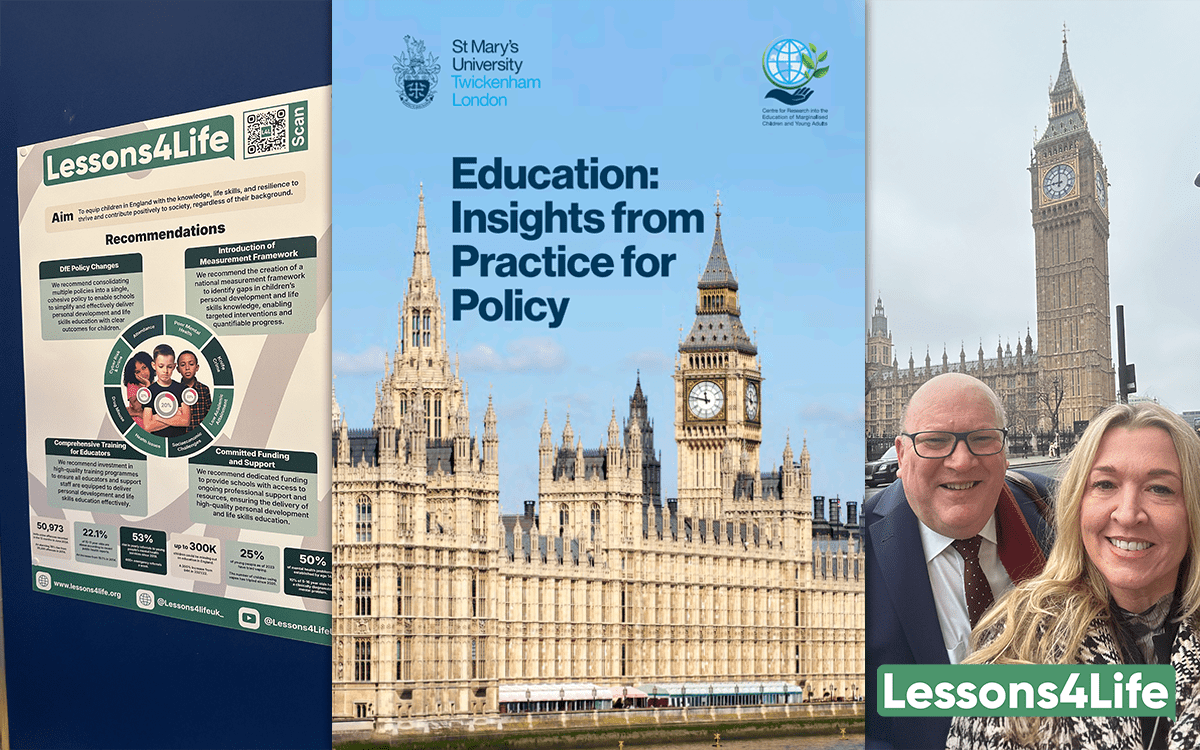Personal development must be given much greater prioritisation than it currently receives, and there is a strong case that progress in this area should be measured. Hayley Sherwood, governor for PSHE and mental health at The Leys Primary and Nursery School, explains why
What do PSHE, RSE, British Values, Protected
Characteristics and Character Education
all have in common? Two things: they
have all been thrown at schools with too
many grey areas around assessment,
curriculum coverage and teacher training,
and fundamentally they all fall under the
broader banner of personal development.
It is personal development that we should
be focusing on going forward. Assisting
children with personal development is
crucial as it nurtures emotional resilience,
healthy relationships and essential life skills.
It empowers them to face life’s challenges,
make informed choices, and become well-
rounded individuals who contribute positively
to society, setting the foundation for a fulfilling
and successful future. Personal development
must be given much greater prioritisation
than it currently receives, and there is a
strong case that progress and attainment
in this area can and should be measured.
Why? Because we need to focus more on
prevention, not cure, to reduce the major
societal issues we are facing in this country.
Our children are vulnerable, and we should
be doing everything we can to protect
them from growing threats in society.
Knife crime
Knife crime
Let’s look at knife crime. Statistics paint a stark
picture: incidents of knife-related violence are
on the rise. According to the Office of National
Statistics, in the UK alone, police recorded
over 50,500 offences involving a knife or sharp
instrument for the year ending March 2023;
representing a 10 per cent increase from the
previous year. Sadly, these figures are not just abstract numbers – they represent lives
shattered, families torn apart, and communities
left in fear.
But why are these numbers climbing? The
answers are complex and wedged deep within
societal, economic, as well as cultural factors.
However, one undeniable truth emerges: knife
crime often starts young. Many perpetrators
and victims alike are teenagers or even younger.
This is where the power of education comes into
play. Education is not just about reading, writing
and arithmetic – it is about equipping young
minds with the tools they need to navigate
the complexities of the world around them. By
educating our youth about the dangers of knife
crime, we empower them to make informed
decisions and resist the pull of violence.
Childhood obesity
The challenge of childhood obesity is another
pressing public health concern for the UK.
According to Public Health England, 23.4 per
cent of children in Year 6 are obese. Diabetes
currently costs the NHS E14 billion per year
[E25,000 a minute) and the impact of obesity
on children’s physical and mental health will
inevitably lead to future costs. In terms of
the PSHE community, we have seen a hugely
positive push for more education on healthy
nutrition in schools. From Jamie Oliver’s
Healthy School Foods Awards to encouraging
good mental health, we believe the holistic
approach is making a real difference to our
pupils’ overall health and wellbeing. But in
both these cases, and others, more early education for children from primary school age
is needed, including additional focused lessons.
Schools are in a very strong position to
support children in developing positively and
creating an impact on the next generation. To
help educate children in areas such as conflict
resolution, emotional regulation and self-
care, improved self-worth and self-confidence,
reduced anxiety, healthy relationships, and
better understanding of nutrition, we can
reasonably expect that increased coverage of
personal development will ultimately impact
on societal issues in the long term – but
schools need data to inform their focus.
Assessing knowledge
There is currently no way of formally and
consistently assessing children’s knowledge
of personal development and evaluating
various aspects of their emotional, social
and moral growth at key stages of their
education, for example through Sats. In
response, we have identified an opportunity
to introduce two 25-minute tests to gather
children’s personal development knowledge
at the end of primary school, and created a
draft ‘Personal Development Transition Quiz’
which provides schools with the ability to
quickly assess and gather data on their pupils’
knowledge when it comes to this area. This
gives teachers personal development data,
which does not currently exist, before children
transition from Year 6, and helps them to
address gaps in knowledge for individuals/
groups and sharpen the focus of their
personal development education provision.
The quiz itself provides a sequence of multiple
choice questions which cover 12 areas of
personal development, all closely linked to
PSHE and RSHE curriculum. Once a pupil
has completed and submitted their choices,
teachers can assess data and adjust focus for
their lessons, assemblies, etc. This, in turn,
gives staff the reassurance that pupils are fully
prepared for their transition to secondary
education and beyond. The software provides
schools with year-by-year data – data can be
filtered by groups such as pupil premium, SEN
and other – and allows them to retest pupils
to evidence where they are closing any gaps.
By identifying how schools are closing the
gaps, not only can staff feel satisfied that
they are supporting pupils to transition into
secondary prepared for their new challenges
ahead but this evidence can also positively
improve inspection outcomes: supporting schools in meeting Ofsted grade descriptors
on schools’ intent to provide for the personal
development of all pupils, and the quality
with which they implement this work. The
principle of such a test may be a useful
starting point for further development by
the Department for Education (DfE), and
consideration ultimately given to whether it
becomes a statutory requirement for schools.
More time on the curriculum
As part of our longer term campaign, we are
also calling for the next government to consult
with the teaching profession on increasing
the amount of time in the curriculum for
coverage of personal development topics from
45 minutes to ideally 1.5 hours per week, and
finding a way to rebalance curriculum priorities
to make space for teaching it effectively.
We recognise that space will need to be
created in an already cramped national
curriculum, but this is about priorities: as we
know too well, education is not just about
what happens within the four walls of a
classroom – it is about creating a culture of
responsibility and accountability within our
communities. Lessons may be focused on areas
for development identified in the fully-fledged
personal development test. For example, there
could be more around the impact of knife crime,
and additional lessons on conflict resolution
and peer pressure. On obesity, greater focus
on healthy eating, and lessons on cooking,
making healthy choices and mindfulness,
would be natural early intervention activities.
The outcome would be more effective
education (especially in primary schools)
and, through earlier and better targeted
intervention, potential to impact on major
societal challenges and related government
spend over time. A desirable follow-on benefit
would be to reinvest attributable cost savings
on related societal issues made in the longer
term into personal development education,
including teacher training, through the new
ITTECF framework and ongoing professional
development, and high-quality resources.
In the shorter term, however, we might also
consider how pupil premium funding may
be used to support personal development
in primary and secondary schools.
Investing in young people
In the fight against major societal challenges, education is our most powerful weapon. We
believe in the transformative power of schools to shape the future and foster personal, social
and emotional growth. Seeking to address
issues in secondary schools is too late – we have
to do more in primary. By arming our children
with knowledge, empathy and resilience, we
can create a generation of changemakers who
are equipped to build a better soclety for all.
It will not be easy, and the road ahead may be
long and challenging. But by investing in the
education and empowerment of our young
people, we invest in a brighter, more hopeful
future, and crucially one where every child may
grow up in a safer and healthier country.
Hayley Sherwood is founder of 1decision and governor for PSHE/mental health at
The Leys Primary and Nursery School.
Further Information: www.1decision.co.uk



